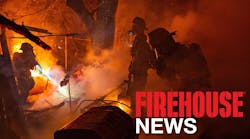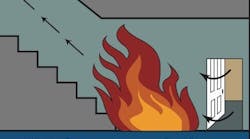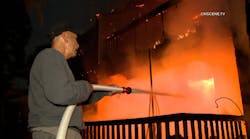Let me start off with an observation. You are the fire chief in a small, suburban community. Your fire department has been in business for well over 125 years. The department is a fixture in your area and is well-thought-of by pretty much one and all in town. You have been a member for a long time now and thought you were comfortable with your role as the chief.
However, things have been happening lately which are causing you to feel a bit uneasy about the future of your group. It is coming to the point where people are questioning just about every order you give, or each request that you make. The normally active people who have been the backbone of your department for a great many years are not turning out any more. They are skipping the alarm malfunctions, trash fires, and false alarms. It is getting real lonely in the middle of the night with just a basic crew of four or five people turning out.
A great many of these folks have been buddies for a great many years; many going back to high school and childhood friendships. Where once you remembered experiencing a great sense of teamwork you now see a group of people whose seem to be acting out as an array of selfish individuals.
Guess what my friend? There is a real good reason for what you are seeing. These people are individuals and they are simply returning to the roots of the elementary human behavior. You are suffering through one of the great problems that every person in a leader ship position will face at one time or another. People are unique creatures and you must take this fact into account every time you come together with the members of your team.
You cannot lead your people in the same manner as that proposed by early management and leadership studies. Back in the day, people were considered to be nothing more than a resource, much like water, steel, wood or money. They were thought to be expendable 'things', rather than individual human beings with feelings and emotions. Today we (hopefully) look at things differently.
This change did not come overnight. It came over time as a result of a wide variety of studies which were completed by colleges and universities around the world. Let me also stress that these research projects were stimulated by members of our nation's industrial world. Many of these studies started out as projects to identify how companies might be able to get more labor out of each individual worker. There were very few lofty ideas and ideals back in those days.
These changes came about at least in part as a result of the human relations movement within the management research field. This movement began as a seemingly accidental offshoot of an existing time and motion study. The original premise for this study involved the alteration of environmental variables within an industrial setting. The study was conducted at the Hawthorne facility of the Western Electric Company in Illinois from 1927 until 1932.
Elton Mayo and a group of fellow Harvard researchers were working to assess the impact of various lighting levels in that factory. When light was added to their working environment, people worked harder. This seemed to make sense to the researchers. To qualify this, they took away light to see what would happen. Wonder of wonders, rather than drop back to a lower level of productivity, these people began to work even harder.
Being good researchers, they worked many different iterations of the working environment. After experimenting with a number of environmental factors, the researchers came to believe that it was the attention being paid to them which motivated the workers, not the factors themselves. One of the interesting elements of the whole study process is that the workers' productivity seemed to improve when changes were made and slumped when the study was concluded.
In his writings on the subject, Mayo says that the effects which his team observed had to do with the fact that the workers felt better in the situation, because of the sympathy and interest of the observers. He does say that this experiment is about testing overall effect, not testing factors separately. Think about this for a moment. Do you not feel better in those situations where you think that someone sincerely cares about you and what you are working to accomplish in your fire department?
Let me suggest to you that there are a number of concepts which were identified by these research projects which may have an important part to play in the operation of your local fire department:
- Peer pressure - the effect of the group upon the individual
- Group norms - the standards of conduct as determined by the group
- The informal work group - relationships which actually form between and among the members of the group
- The informal leader - a group member who gains the respect of the members of the work group because they most exemplify the ways in which the group expects its members to perform
At the base of all human relations is the concept of behavior. These are the actions of the individual and are based upon a wide variety of factors which stimulated the person as they grew and matured to adulthood. We seek to study and explain how people act so that we may explain what they do. This is done to develop some sort of capability to predict how people will act during a future period. If we are able to do this, we might be able to develop some way to influence people in the performance of their duties.
The study of individual human behavior is a very complex and complicated matter. I say this because each of us is a unique individual shaped by the events of our specific lives. There are hereditary, environmental, and group interactions which serve as part of the crucible within which each of us is formed as a unique human being. Let us look at the variables which have a continual impact upon each of us as we live our lives:
- Physiological variables such as body style
- Psychological variable such as perceptions, attitudes, learning ability, motivation and personality
- Environmental factors during infancy, adolescence, and adulthood
- The impact of social class
It is critical to remember that no one factor can ever be divorced from the others in a study of the people around you. Each person in your fire department is a complete and unique package at all times and in all places. Let us now take a closer look at the parts of the human equation.
Research has shown that different body types respond differently to both training and nutrition. As a result, it is incredibly important to be aware of what your body type is so that you can design a training and workout program accordingly. In this article, the history of body types and some interesting pieces of information to help you identify them will be mentioned.
William Sheldon (1898-1977) was an American psychologist who spent his life observing all the variety of human bodies. He taught at several universities and spent his career doing valuable research. As a child he was an avid observer of animals and birds, and as he grew up, this hobby turned into a strong ability to observe the human body.
The basics of body types are listed below:
- The endomorph - the happy chubby fellow, not physically active, eats a lot and prefers to relax
- The ectomorph - the thin, shy, and jumpy type of person who is somewhat nervous, easily spooked, and hesitant to act
- The mesomorph - the hard-charging NFL running back kind of person who is action-oriented and physical in nature
Let me suggest to you that each of these differing types of individuals will require a different supervisory style from you, their leader. You might have to stimulate the endomorph, restrain the mesomorph, and protect, defend, and stimulate the ectomorph. You ignore this advice at your own peril.
There are a number of mental activities which must be considered within the framework of organizational psychology and its impact upon your fire department. The affects of these things makes your job a lot harder. Let us look at them:
- Frustration - the ability of an individual to withstand and deal with roadblocks which are placed in their way.
- Conflict - the operation of dissimilar kinds of behavior at the same time; for example, you want to sleep and your pager is beeping to wake you up for a run in the middle of the night.
- Anxiety - any threat to your well-being or needs gratification such as hunger, thirst, or fear.
Let me also suggest to you that in addition to the mental factors mentioned above, there are always certain environmental variables at work in your life and the lives of your people. Each of us has developed within a particular type of family and community environment. As stated earlier, we are all shaped by the collective impact of our individual experiences.
Let me ask you to think about the following influences and how they might affect the psychological development of an individual:
- Early infancy - a happy, loving home with two parents, versus a single-parent home, versus the impact of an orphanage or foster care
- Adolescence - urban versus suburban
- Social class - Upper class versus middle class or working class
It is my opinion that what you are today involves some combination of all of the above-listed factors. My research as combined with the living of my life, has led me to understand the importance of the many potential combinations of factors you will encounter within the ranks of your fire department.
Let me also suggest that you need to consider a number of psychological variables which are always at work within the people who make up the roster of your fire department. All of the following things come together to influence the behavior of your people:
- Perceptions - how you receive life's clues and symbols
- Attitudes - your mental state of readiness for needs arousal; your readiness to think, act, and perform
- Learning - the change in behavioral practices occasioned by education and experience
- Motivation - the rewards which make the actions of individuals worthwhile
- Personality - the resulting combination of cultural and social factors that a person develops to meet the needs and expectations of their overall social group
It is important to note that many of the factors which I have mentioned in this column are moving targets. People change over time as their situations and circumstance change. As the leader, you must constantly monitor the acts, actions, and activities of the folks who have been placed in your care. A failure to stay up with your people can surely lead to a failure of your organization to perform at a crucial time.
Let me close by asking a single final question. Now do you understand why people are being to question your orders? If your answer is yes, good, however let me now break your heart. There are also differences among generations which can lead to similar problems.
HARRY R. CARTER, Ph.D., CFO, MIFireE, a Firehouse.com Contributing Editor, is a municipal fire protection consultant based in Adelphia, NJ. Dr. Carter retired from the Newark, NJ, Fire Department and is a past chief and active life member of the Adelphia Fire Company. He recently published Leadership: A View from the Trenches and Living My Dream: Dr. Harry Carter's 2006 FIRE Act Road Trip. You can reach Harry by e-mail at [email protected].





